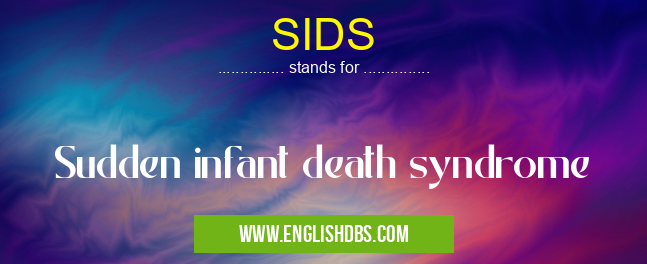What does SIDS mean in SYNDROMES
SIDS (Sudden Infant Death Syndrome) is a medical term used to describe the sudden, unexplained death of an infant under one year of age. It is also known as crib death or cot death in some countries. The exact cause of SIDS is still not fully understood, but there are certain factors that increase an infant’s risk of SIDS. Because the exact cause of SIDS has yet to be determined, there is no way to prevent it, although there are some steps parents can take to reduce their baby’s risk.

SIDS meaning in Syndromes in Medical
SIDS mostly used in an acronym Syndromes in Category Medical that means Sudden infant death syndrome
Shorthand: SIDS,
Full Form: Sudden infant death syndrome
For more information of "Sudden infant death syndrome", see the section below.
Measures Parents Can Take To Reduce Risks Of SIDS
Fortunately, several measures parents can take to help reduce their baby’s risk of developing SIDS and keeping them safe while they sleep include placing your infant on his/her back for every sleep time; using a firm mattress covered by only fitted sheets; avoiding excessive bedding or items inside the crib; breastfeeding your baby until six months old; immunizing against infectious diseases; taking steps to create a smoke-free environment; making sure your baby does not get too hot during sleeps times; attending regular well-baby checkups; ensuring safe sleeping conditions when co-sleeping with your infant; not allowing caregivers to use extended tummy time when caring for your baby, etc.
Essential Questions and Answers on Sudden infant death syndrome in "MEDICAL»SYNDROMES"
What is Sudden Infant Death Syndrome (SIDS)?
Sudden infant death syndrome (SIDS) is a type of sudden, unexplained death that occurs in infants under one year of age, typically while sleeping. There is no known cause for SIDS.
Are there any common factors associated with SIDS?
Several risk factors have been identified that may increase the likelihood of SIDS, such as prenatal smoking or exposure to second-hand smoke, unsafe sleeping environments and premature birth. However, many cases occur without any risk factors.
How can I reduce the risk of SIDS for my baby?
You can help lower your baby’s risk by placing them on their back to sleep; using a firm mattress with a fitted sheet; avoiding soft bedding, like blankets or pillows; and keeping your baby smoke free before and after birth.
What should I do if I find my baby not breathing?
If you find your baby unresponsive or not breathing normally, call 911 immediately. If the baby is unconscious but still breathing in an abnormal pattern, begin CPR right away and continue until help arrives.
Could vaccination prevent SIDS?
While there is no definitive medical proof that vaccinations can prevent SIDS, immunizing your infant according to recommended schedules may help reduce the baby's chance of developing certain illnesses which could further increase their risk of experiencing a fatal episode due to SIDS.
Does co-sleeping cause SIDS?
Co-sleeping has not been linked directly to an increased risk of SIDS but it does pose other risks such as suffocation or entanglement in bedclothes so it's important to consider the environment carefully if you choose to bring your baby into bed with you.
Is co-sleeping safe for babies?
Co-sleeping can be safe if done correctly following established guidelines such as making sure the mattress surface is flat and firm without pillows or blankets; always place babies younger than 12 months on their backs; remove all soft materials such as stuffed animals from near the child’s head; avoid overheating; and dress both parent and child appropriately for sleep temperature.
Does swaddling reduce the risk of SIDS?
In recent years research studies have suggested that swaddling newborns may reduce their risks of sudden infant death syndrome (SIDS). When swaddled tightly around arms and chest infants are less likely to roll onto their stomachs or cover their faces when they sleep which could decrease their odds of experiencing a life threatening event due to undiscovered morbidity.
Final Words:
Although it may be impossible to determine why an infant dies from this unfortunate syndrome and completely prevent it from happening, these preventative measures are recommended as they can help reduce an infant's chances of developing this tragedy and keep them safer while asleep – which is vital for even healthy babies' health and safety! If concerned parents ever notice anything unusual about their children's breathing patterns during sleep or become worried about their safety when sleeping, they should always contact emergency services immediately!
SIDS also stands for: |
|
| All stands for SIDS |
